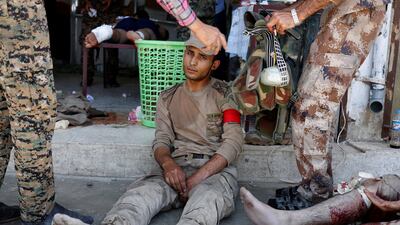BEIRUT// Washington’s warnings to the Syrian government against launching a fresh chemical weapons attack appear to have worked, the US secretary of defence Jim Mattis said on Wednesday.
No chemical attack has been launched, he said, leading him to conclude that, "It appears that they took the warning seriously. They didn't do it.”
On Monday, the White House said the Syrian government was possibly preparing to launch a fresh chemical weapons attack, and warned that if that were the case, Syrian president Bashar Al Assad and his military forces would pay " a heavy price."
Later, the US said it had observed Syrian forces preparing for a chemical weapons attack at Shayrat air base, the same base that was hit by a US Tomahawk missile strike in April.
Syria and its ally Russia denied any chemical attack was being planned.
The civilian toll of the war continues to climb. On Wednesday, the UK-based war monitor, the Syrian Observatory for Human Rights, said at least 30 civilians were killed in air strikes on territory held by ISIL in Deir Ezzor province, eastern Syria, but could not ascertain whether Russian, Syrian or US-led anti-ISIL coalition jets were responsible..
On Monday, 57 people, including 42 civilians, were killed in an air raid on an ISIL prison in the town of Mayadeen, which is believed to have been conducted by the US-led coalition.
As ISIL begins to weaken inRaqqa, its last major stronghold, and the Kurdish-led Syrian Democratic Forces fighters gain more territory, civilians are increasingly at risk of getting caught up in the fighting. As US-backed forces press on into Raqqa, the United Nations human rights chief Zeid Ra’ad Al Hussein On Wednesday warned that up to 100,000 civilians remained trapped in the city.
“The intense bombardment of Al Raqqa over the past three weeks has reportedly left civilians terrified and confused about where they can seek refuge,” he said. “Up to 100,000 civilians are effectively trapped as the air and ground offensive intensifies.”
Residents who have succeeded in escaping relate that ISIL prevents civilians leaving by either shooting at them or escorting them back to their homes.
“We couldn’t get out…they wouldn’t let us,” said Shaabu,a resident of Raqqa until he managed to escape on Tuesday. “If we stepped outside we were targeted by snipers. They shot at me once when my friends and I went out to fetch water.”
He had escaped with his family only when Syrian Democratic Forces troops approached his area and made contact.
Elsewhere in Syria, the Turkish army and the Kurdish YPG militia - the main component of the US-backed Syrian Democratic Forces group - clashed along the Syria-Turkey border on Tuesday.
Ankara, which considers the YPG and Syrian Democratic Forces to be terrorist groups, said the YPG attacked pro-Turkey Syrian rebels near the town of Azaz. Turkey used artillery against the YPG in retaliation.
The YPG has been America's best ally on the ground in Syria, causing tensions between Washington and Ankara. But rather than drop the YPG, as Turkey frequently urges them to do, the Americans have increased support for both the YPG and the broader Syrian Democratic Forces alliance. Ankara also made a play for the lead role in the battle for Raqqa, only to see that job go to the Syrian Democratic Forces.
The US special envoy to the coalition against ISIL, Brett McGurk, was in northern Syria on Wednesday for a meeting with a council created by the Syrian Democratic Forces that aims to run Raqqa after ISIL is forced out of the city.
A member of the Raqqa Civil Council, Omar Alloush, said Mr McGurk and other US officials promised to help with infrastructure needs in the city, but did not discuss how much money Washington could provide.
“They did not specify any sum, but they decided we will support first removing mines, lifting rubble, maintenance of schools, then electricity stations and water,” he said.
jwood@thenational.ae
*with additional reporting from Reuters and Agence France-Presse

